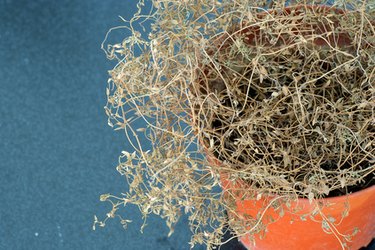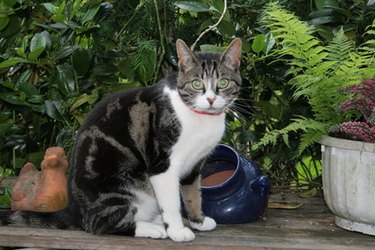
Music can be used to incite and inhibit plant growth, depending on the type of music that is played. Melodies have also been shown to soothe animals that are frightened or cause animals to kill. Therefore, choosing music that benefits your plants and animals might help you grow better plants and have calmer pets.
Music that Encourages Plant Growth
Video of the Day

In Dorothy Retallack's book "The Sound of Music and Plants," Retallack lists the effects that classical and rock music had on plants. In her experiments, the plants that were exposed to classical and Indian sitar music leaned toward the speakers and began to grow and flourish.
Video of the Day
In the 1950s, Eugene Canby of Canada began experimenting on the effects of violin music on wheat crops, discovering that wheat crops exposed to violin sonatas increased their yield by 66 percent.
Music that Stunts Plant Growth

Retallack's experiment also determined how plants reacted to hard rock music, especially music containing a lot of heavy drum beats. Plants exposed to Jimi Hendrix and Led Zeppelin grew gangly, leaning 30 to 70 degrees away from the speakers, and their leaves became weak and their blossoms drooped.
Retallack's experiments on tones showed that plants exposed to the same tone continuously, died, while plants exposed three hours a day flourished, even more so than plants not subjected to any tone.This experiment proved that too much music, no matter the type, can harm plants more than no music at all.
Music that Calms Animals

One study, done by physicist Harvey Bird and neurobiologist Gervasia Schreckenberg, exposed groups of mice to the sound of traditional voodoo drumming, Strauss waltzes and silence. Upon exposing the mice to these sounds, the scientists tested their ability to navigate a maze. Mice that listened to Strauss navigated the maze more quickly than mice that were exposed to silence.
A study done by the University of Belfast's psychology department in 1997 produced results indicating that dogs exposed to classical music were more relaxed and rested for longer periods than dogs exposed to no music or heavy metal music.
Music that Incites Animals to Violence

The same study by Bird and Schreckenberg showed that mice exposed to voodoo drumming performed increasingly worse over time as the exposure to the voodoo music continued. Eventually they became disoriented and were unable to finish the maze.
In Merrell's experiment, the hard rock-exposed mice took 30 minutes to complete the maze and began exhibiting cannibalistic behavior toward one another.
Using Music to Benefit Your Plants and Pets

There are many ways to put these findings to work on your own plants and pets. If you have a dog or cat that seems nervous when left home alone, trying turning your radio to the classical station when you are away.
You may have plants that are not doing well in your home or garden. Try playing classical music to your plants a few hours a day. You will know the music is working if your plants begin to flourish and their stems reach toward the radio, as if reaching toward the sun.